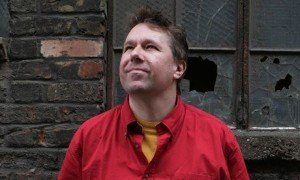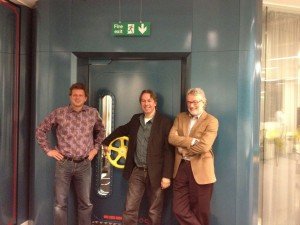One of the outstanding contemporary SF writers is welshman Alastair Reynolds. Many members of the SFmag staff value his work very highly and although not holding our breaths we still look forward to his new novels with an unusually high level of anticipation. Since this december the second Reynolds book has been published in Hungarian, the renowned Revelation Space which brought major success to the author, we found it was a nice opportunity to ask for an interview from Al. Which we got, so here it goes:
SFmag: To whom do You write primarily?
Alastair Reynolds: Definitely myself. I’m delighted to have readers, but the moment you start trying to bend your writing to suit a perceived audience, you’re doomed.
SFmag: Where are You in Your writings, if there at all?
AR: At the risk of flattering myself, I like to think that I’m there whenever one of my characters is calmly skeptical, impressed by the universe but not looking for a supernatural explanation beyond the obvious facts. I was a scientist and that’s not something you shake off.
SFmag: What is the status of science fiction in Great – Britain? (In Hungary it is pretty much only for a very narrow audience)
AR: It comes and goes, and depends to some extent whether you mean SF as a written form or as a visual medium. Television and cinematic SF has always been quite popular, and remains so at the moment. Literary SF has always had a smaller audience, and for now it is not doing as well as epic fantasy. But I have never really bothered worrying about such things. I have an audience, a readership, and as a reader of SF myself, there is plenty of good stuff out there.
SFmag: What are You reading currently? Do You read a lot of science fiction?
AR:I am currently reading an SF book by a debut author, but it’s not all that usual for me to be reading SF. I read a lot of crime, historical and mainstream fiction, and a lot of non-fiction. The last book I read was about a climbing accident on K2. I read a lot of mountaineering books.
SFmag: Regarding the increasing popularity of ebooks, where do You see the future of books and publishing in say 10 years?
AR: I’d hate to say. The music industry has not handled the transition to downloadable formats very well but hopefully the publishing world can steer a smarter course. Obviously, you can’t fight the technology. At my most optimistic, there will still be a large demand for print fiction, and at the same time the industry will have figured out how to monetize downloads without the reader feeling short changed. We’ve some way to go but I think there is a genuine desire to do right by the publishers.
SFmag:Do You prefer writing in an established world, like that of Revelation Space? Will You return to the universe of House of Suns?
AR: The grass is always greener on the other side of the hill, as we say. Writing in an established universe is a lot of fun because you have that backdrop already in place and you can make play around with sly little references to earlier stories and characters. On the other hand, it’s immensely limiting. Starting with a completely blank canvas is also a great deal of fun. I’d like to return to the HOS universe, yes – but no immediate plans. It’ll definitely be a few books before I get to that.
SFmag: What were Your first impulses that led to You being an SF writer? When did You write Your first story?
AR: I was drawn to SF themes from a very early age. I went to see a pair of James Bond films when I was very small and they had an enormous influence on my imagination. The day after, in school, I tried to write a James Bond story. That may have been the first. I do actually have one of my very earliest pieces, a story about an astronaut and a computer on a planet, and I recently scanned it into my blog.
SFmag: What do You think makes a story good?
AR: The collision of two disparate themes, each commenting on the other. A seamless integration of character and theme. A high level of literary polish. I’m lucky if I hit one of those things.
SFmag: What was Your first read which really made an impact on You? (Obviously, not only SF…)
AR: The first story I remember being *really* affected by was an early Arthur C Clarke story, A Meeting with Medusa. I read it when I was eight, and it really had a strong effect on me.
SFmag: What is Your opinion of fantasy as a genre? (being an SF writer)
AR: I’m cool with fantasy. It’s not my personal cup of tea but it would be stupid to argue that there is not good and valuable work being done.
SFmag: Do You have a unique method of writing? Do You have someone who always checks Your new stuff?
AR: I don’t have any special methods. I just sit and write. I don’t outline in great detail, preferring to write into a draft and then solve problems as I go, even if that means discarding a lot of material. I aim to write about 3000 words a day, but I don’t always hit that. Sometimes I go well over it, on the other hand. My wife is normally my first reader, she’s very good at being honest and my stories have improved for her feedback.
SFmag: How does a scientist become an author?
 AR: I can’t say, really, because I was writing and selling right through my early scientific career. The two things developed in parallel. It’s difficult to do both, though – well, I found it hard, anyway. Science is very much a life-consuming career choice. Scientists are workaholics (this has been proven scientifically, by studying the times at which papers are uploaded to preprint servers!) and that doesn’t leave a lot of slack for writing fiction. But some so manage it very well.
AR: I can’t say, really, because I was writing and selling right through my early scientific career. The two things developed in parallel. It’s difficult to do both, though – well, I found it hard, anyway. Science is very much a life-consuming career choice. Scientists are workaholics (this has been proven scientifically, by studying the times at which papers are uploaded to preprint servers!) and that doesn’t leave a lot of slack for writing fiction. But some so manage it very well.
SFmag: Is there a literary world where You would live?
AR: In Wales, yes, but in the area where I live, not especially.
SFmag: Is there a possibility to see one of Your stories as a Hollywood movie in the near future?
AR: Not much likelihood of anything happening soon, I’m afraid – if at all. There are occasional nibbles of interest but not have got very far. It’s not something that bothers me all that much.
SFmag: How do You see the future of humanity?
AR: Turbulent. But I do think we have a future, which is more optimistic than some. Broadly speaking, I think we’re gaining a gradual collective wisdom about our planet and our place on it. We will probably continue to screw things up for some time, but at least we won’t be doing it from a position of total ignorance.
SFmag: Do You have a message to Your Hungarian readers?
AR: I’m amazed and delighted to have readers anywhere, let alone in Hungary. It is an immense privelege to be read in another language, and I am truly grateful – not just to the readers, but to the editors and translators who make it possible.
cheers,
Al
December 2012
Hozzászólások
[crei további írásai]

